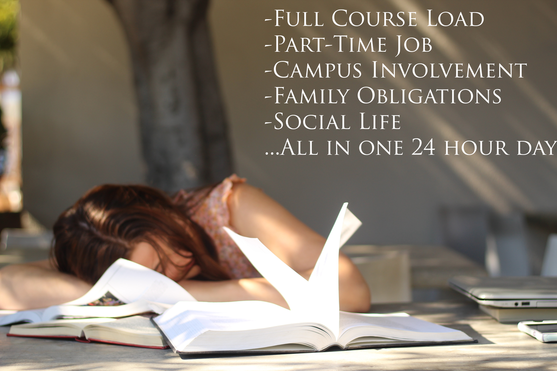24 Hours
|
|
You get up early and go to class. Go to work for a few hours, fit in a quick meal before heading to your next class. Back to work for a 2nd shift. Fit in that club meeting. You're exhausted but still have about 4 more hours of studying ahead. Don't get to sleep until the wee hours of the night. Wake up and repeat it all over again. Your work ethic is strong. That’s in part what got you here. But the fast pace of your week and the load of responsibilities on your plate can feel relentless, with no end in sight. Some days it might make you want to just hide from the world. Although you might not be able to eliminate all that you have to do, you might be able to tweak things a bit to make life more manageable. Here's how:
|
- Schedule in breaks. Between classes, work, and extracurricular activities, first-generation students live extra busy lives. With all that is on your plate, it is important to find time to take a break. That means scheduling in some down time each day just to catch your breath. You say "I have no time!". Here's the thing...if you don't give yourself that break you will burn out and you won't be able to get the things done that you need to.
- Pick a job that benefits you. Many first generation students have to work one or more jobs to support themselves through college. Look for jobs that can preserve your energy as much as you can (e.g., library) or allow you to be socially engaged (e.g., UCen). Perhaps also consider seeking out jobs that can feed back into your interests. For example, if you are studying media and film, perhaps look for a job that gives you exposure to that industry (e.g., Arts & Lectures ticketing office).
- Definitely find time to play. But choose extracurricular activities wisely. Getting involved and finding your people is tremendously important. Your social connections will feed your soul and help even the hardest days feel a bit better. You may have lots of interests but it will be impossible to juggle participating in too many groups all at once. Also, be careful of taking on roles and responsibilities that will further throw off your balance. Realistically assess the time you have and the the time commitment they are asking for. You may have to decline an opportunity, defer to a later time, or change up another set of your activities to make it happen.
- Find a healthy balance with home. Home is often calling, Sometimes literally. Sometimes it's your heartstrings that are pulling you back. Establishing a good balance means creating boundaries so that you can take care of all you need to here AND also be present and engaged with your family and community at home. Check out here some thoughts on how to build this balance more effectively.
Proudly powered by Weebly

